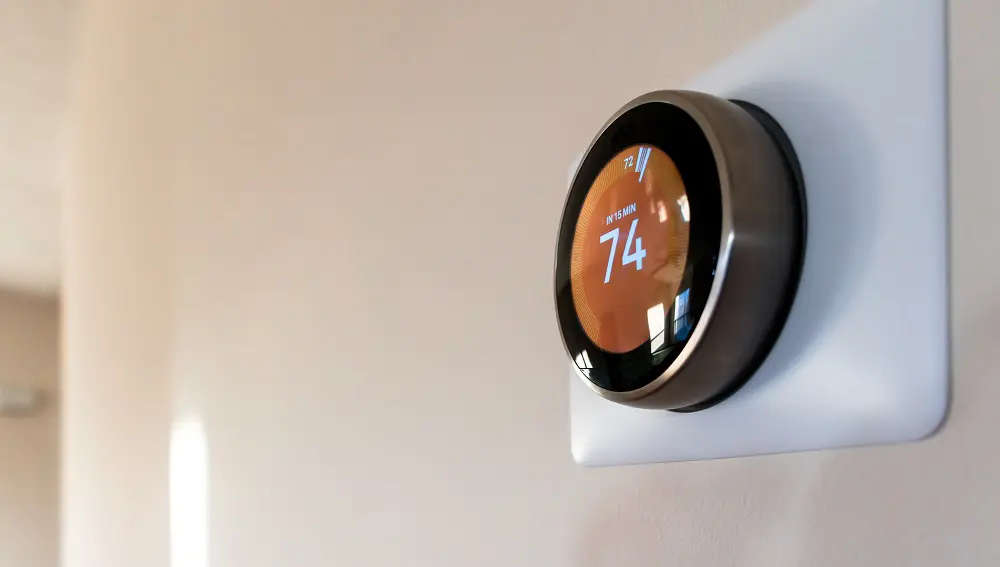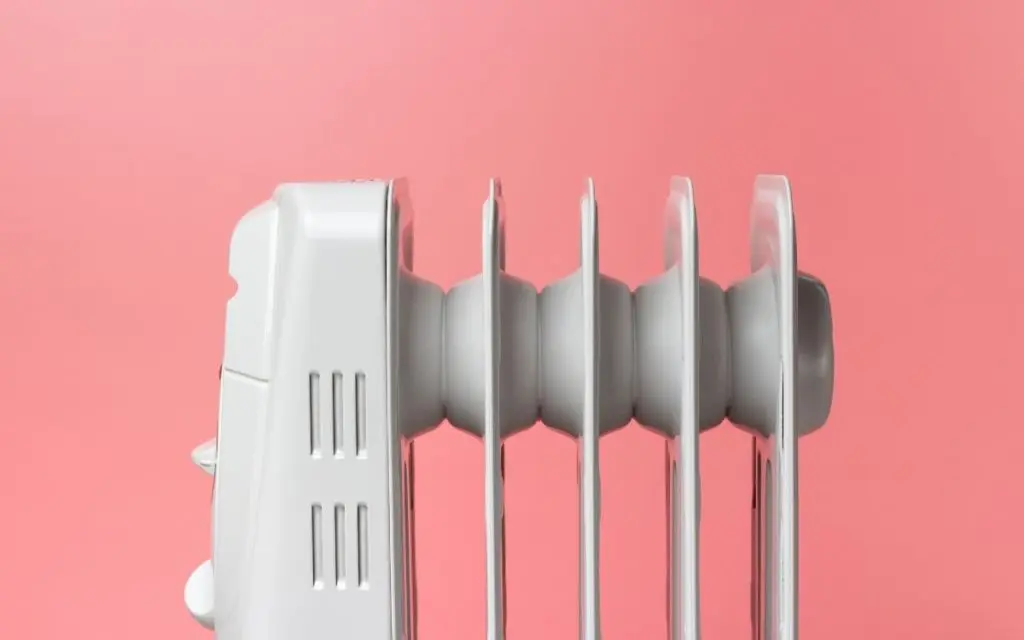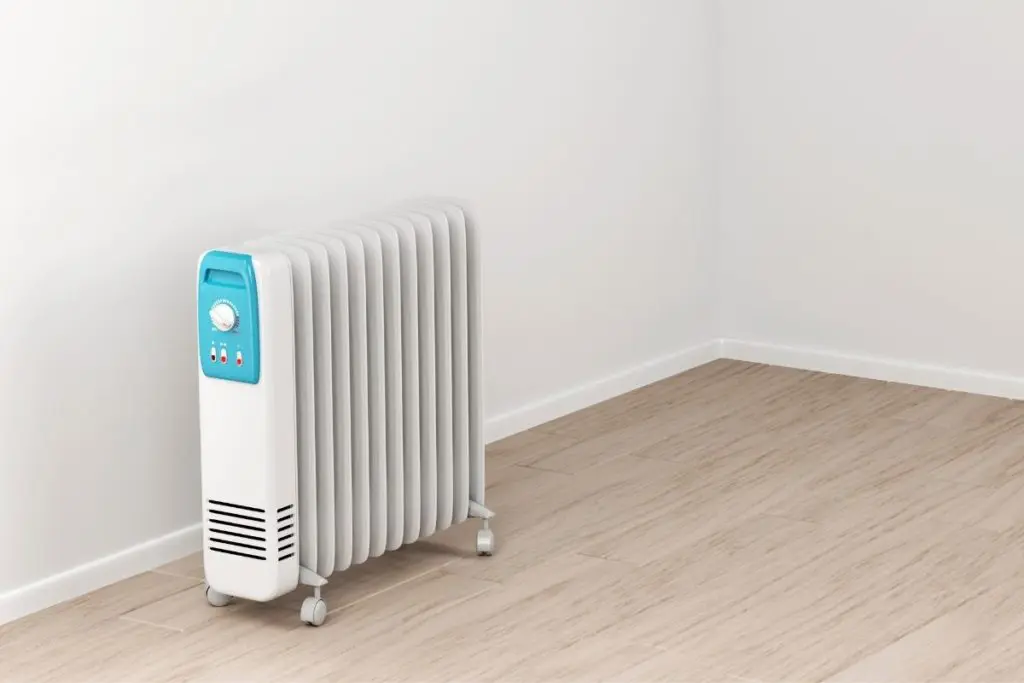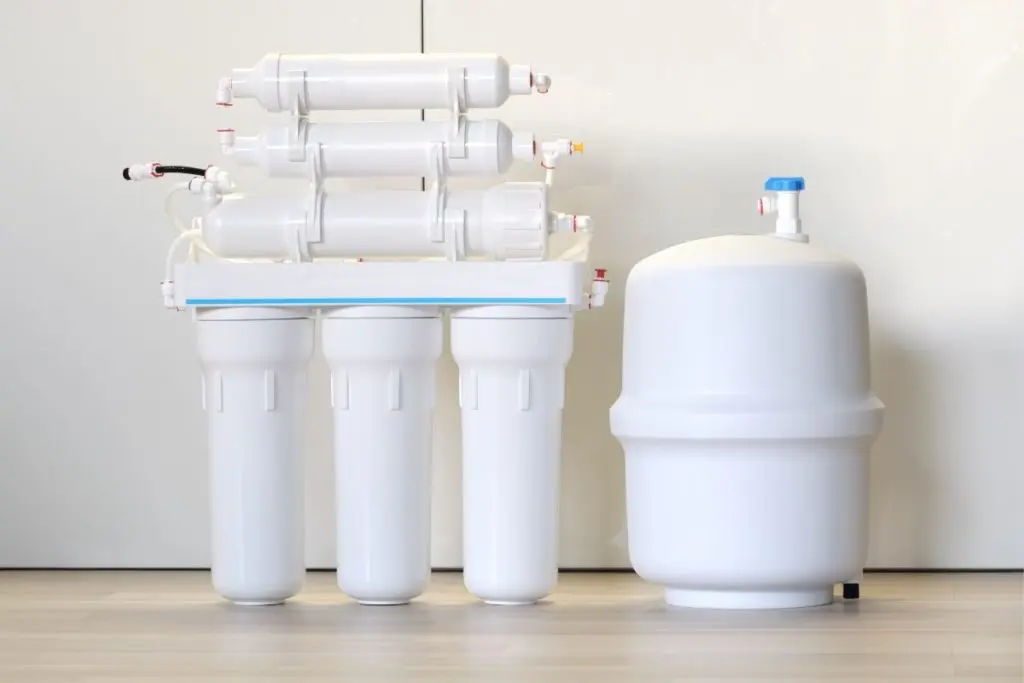We all want to feel warm and cozy in our homes. Luckily we live in an age where there are many practical, efficient, and technologically-advanced heating systems available. But because there are so many options, choosing the right heating system can also feel overwhelming! Let’s dive into the debate of heat pump vs. furnace.
In this article, we’ll look at two of the most popular heating systems: heat pump heating systems and forced air furnaces. We’ll learn how heat pumps and furnaces differ, discover some pros and cons, and then compare and contrast these heating systems across a few categories.
We’re here to take the guesswork out of determining which kind of heating is best for your home. Installing the right system can save you money, make you more comfortable in the winter and summer, and even minimize your impact on the environment.
So what are you waiting for — the heat is on!
Heat Pump vs. Furnace: Quick Comparison
| Category | Heat pump | Furnace |
| Efficiency | ✔ | ✔ |
| a) in a cold climate | ✔ | |
| b) in a warm climate | ✔ | |
| Affordability | ✔ | ✔ |
| Eco-Friendliness | ✔ |
What are Heat Pumps & Furnaces?
Before we can declare a winner in the battle of heat pumps vs. furnaces, we’ll need to learn a little more about each.
What is a Heat Pump?
A heat pump is a dual-functioning system that uses electricity to move heat. In the winter, a heat pump draws warm air from outside (even when it’s cool or cold) and redistributes the heat inside. In the summer, a heat pump reverses the process and works as an air conditioner, removing hot air from your home.
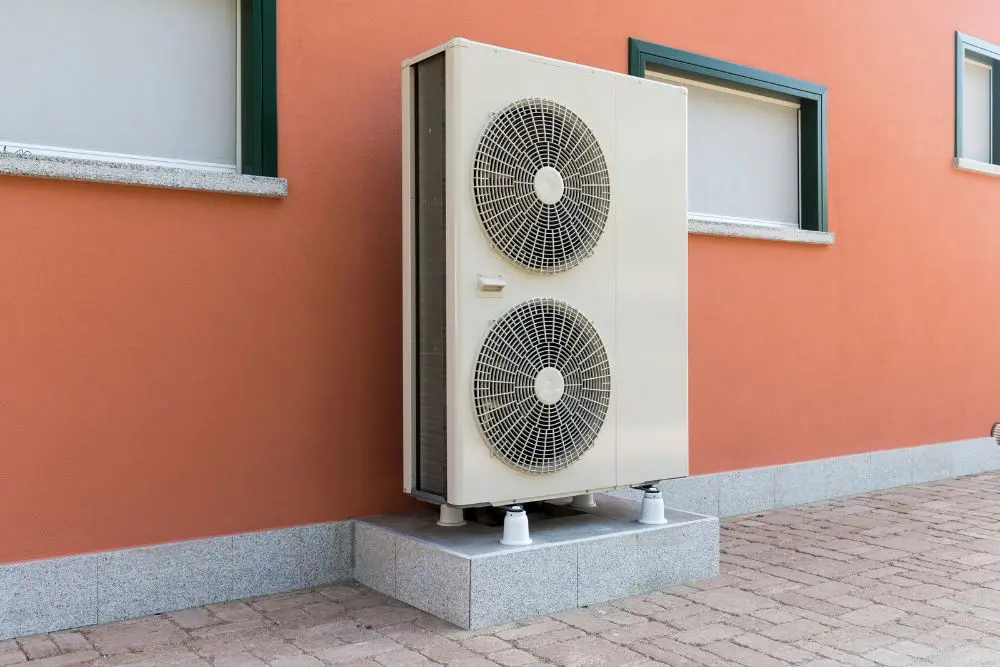
Air to air heat pumps are the most common type of unit, but you can also find water source heat pumps and geothermal (ground source) heat pumps. In most cases, the heat pump installation splits in two — one part of the unit is inside while the other part is outside.
How Does a Heat Pump Work?
Heat pumps work in an entirely different way than furnaces. Heat pumps use electricity to run, while furnaces use fuel to burn. In a nutshell, a heat pump pulls heat from outside, circulates it through refrigerants, and then transfers the heat indoors; it reverses the function to cool. Transferring heat requires less energy than generating it, so that’s why heat pumps are generally quite efficient. In fact, a heat pump can deliver up to 3X more heating or cooling energy than the electrical energy it uses.
PROS
- Can heat or cool your home
- Energy efficient
- Great for warmer climates
- More compact/takes up less space
- No CO2 danger
- Some heat pumps can run in tandem with radiant floor heating systems
- Mini-split ductless heat pumps can be useful in homes without ducts
CONS
- Noisy
- The indoor part of the unit is visible in living spaces
- More expensive initial installation
- Efficiency is variable – far less when temperatures dip below freezing
- Requires space outside of your house
- No heating in the event of a power outage
What is a Furnace?
A furnace is part of a central heating and cooling system, and it’s used to warm entire homes and buildings.
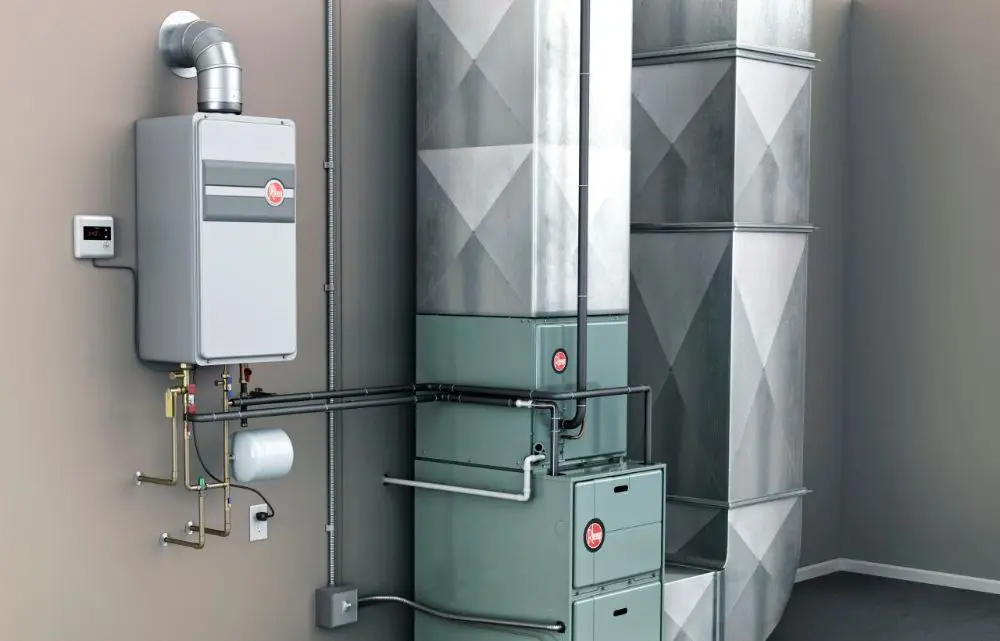
Whereas a heat pump uses electricity to “pump” or circulate air, a furnace takes a slightly different approach, generating warm air via gas and/or oil.
How Does a Furnace Work?
Furnaces run on either gas or oil, although some hybrid systems or diesel versions also exist. A furnace either generates heat by burning a combustible material (gas) or running current through a heating element (electric) and then forces heated air throughout your home. A furnace has four main components: a burner mechanism, heat exchangers, a blower, and a flue that will exhaust any byproducts.
PROS
- Quick, hot heat
- More efficient and cost-effective in cold climates
- Out of sight, away from living areas
- Cheaper initial installation
CONS
- Tend to take up more space
- Only generates heat (does not cool)
- Gas furnaces emit CO2, which can be dangerous if not monitored correctly
- Bigger carbon footprint
Heat Pump vs. Furnace: Differences and Similarities Overview
Gas or electric furnaces are more prevalent in American homes, but heat pumps are becoming an increasingly popular alternative. Let’s explore some similarities and differences and then consider each across a few categories: efficiency, price, and our pick for most environmentally-friendly. Only then can we tackle the ultimate question: which is better?
Differences Between Heat Pumps and Furnaces
- Different technologies. Furnaces generate heat, while heat pumps transfer it. Specifically, furnaces burn fuel, such as gas, or use electricity to blow hot air throughout your home. On the other hand, a heat pump pulls heat from outside and transfers it inside, without any form of combustion.
- A heat pump both heats and cools.
- Aesthetic differences. Furnaces tend to be larger and typically installed out of sight in a basement, garage, or utility room. The bulk of a heat pump system is outside, but some visible components will be in your living space.
- Different kinds of heat. Some people find the heat from a furnace to be “hotter” and cozier. Heat pump owners may find their heat less intense, but also less drying.
Similarities Between Heat Pumps and Furnaces:
- Similar life spans. Heat pumps have a lifespan of around 12-15 years. Furnaces also last approximately 15 years, although a well-cared-for furnace is likely to last even longer.
- Neither is a DIY job. You’ll need professional help with both when it comes to consultation and installation. It’s crucial to rely on an expert’s knowledge to help you select the correct type, make, and model for your space and setup. An expert can help you decide the following:
- the appropriate choice for your climate and humidity zone
- indoor/outdoor placement
- whether you need one or more units and much more
- Both also require advanced electrical wiring skills. Most building codes stipulate hiring a licensed HVAC professional to install any heating system.
Heat Pump vs. Furnace: An In-Depth Comparison
Next, let’s take an in-depth look at how heat pumps and furnaces stack up in terms of energy efficiency, affordability, and eco-friendliness.
Energy Efficiency
It turns out the question of efficiency is a little complicated. It’s not just a matter of electric vs. gas or an electric heat pump vs. a gas furnace. Whether a furnace or a heat pump is the right choice for you largely depends on where you live and how you use energy.
Here’s the big picture.
When looking only at general statistics, heat pumps come out swinging. Heat pumps will generally give you about a 57% to 81% boost in efficiency compared to oil or gas furnaces. They are even more impressive compared to baseboard heating, where a heat pump will run about 300% more efficiently. But even though heat pumps are more efficient on paper, they could still cost more to operate — depending on gas and electricity rates, and where you live.
To determine whether a heat pump or a furnace will be more efficient in your case, consider your climate zone. As a general rule, the colder it gets outside of your house, the more inefficient a heat pump becomes as it labors to warm the inside of your home.
Let’s look at a few different scenarios.
Examples of When a Heat Pump or Furnace is Better for Efficiency
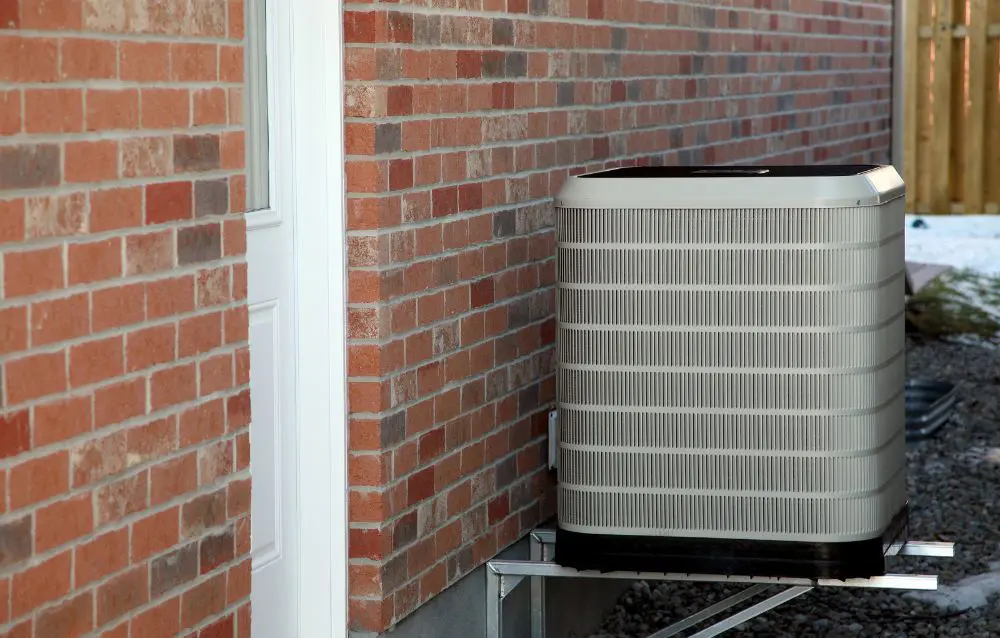
Say you live in a larger home, and you experience significant periods of subfreezing temperatures in the winter. In this case, a gas furnace is likely to be much more efficient than a heat pump if either of the following is true: your home connects to natural gas already, and/or you already have air conditioning.
Comparing heat pump vs. gas furnace operating costs in this scenario further solidifies a furnace as your best choice.
However, if your average winter temperatures remain above freezing, you can really benefit from a heat pump’s impressive efficiency in such a climate. In this round between heat pump vs. gas furnace, the heat pump emerges the winner. And again, since a heat pump offers cooling and heating, you’ll enjoy the additional efficiency of a built-in cooling system during the summer.
In the battle of the heat pump vs. electric furnace, there is also a more clear-cut winner. Unless you live in a very cold climate, the power an electric furnace requires to produce heat will likely be more than what a heat pump uses to transfer heat.
Layout and Maintenance
A few final notes on efficiency:
Make sure to consider your space and layout. No matter which system you choose, getting the right heat pump or furnace for your personal space is critical to enjoying maximum efficiency. Maintenance is also vital. If you can avoid leaks, dirty filters, and any other hiccups or malfunction, your system will hum along at its ideal capacity.
Verdict: Heat pumps are usually the more efficient choice… unless you live in a cold climate.
Affordability
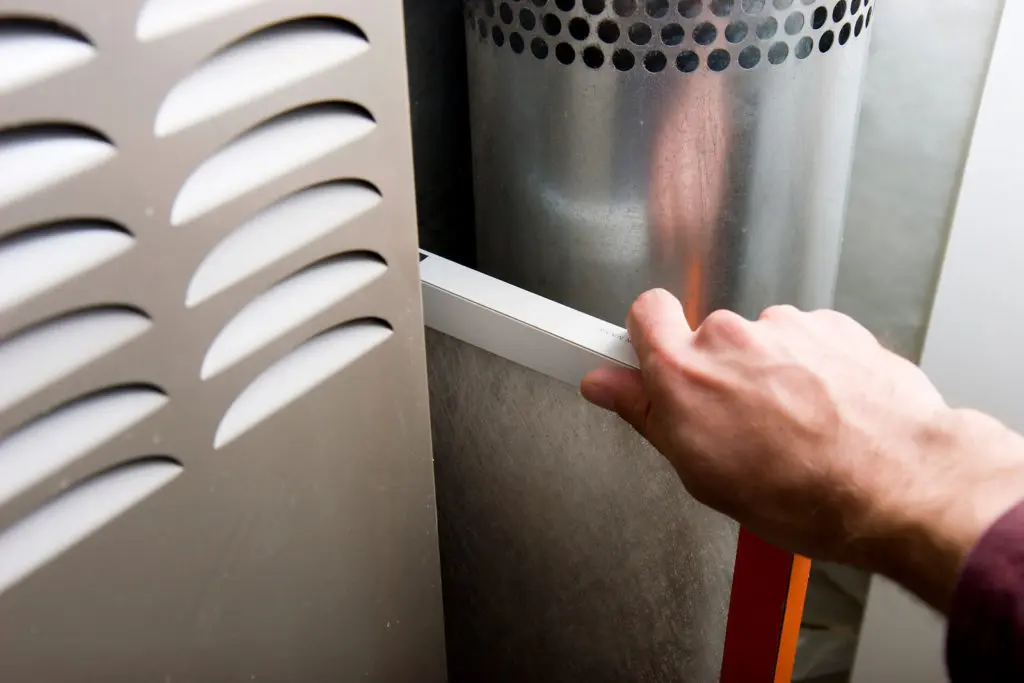
It’s difficult to avoid generalizations when determining the overall cost-effectiveness of a heat pump or furnace. The truth is, it can be tricky, and it depends heavily on many factors.
1
Size
It is important to consider size, layout, and floorplan of your home.
Do you have:
- one or more floors
- open or closed living spaces
- an odd basement
- no space outside
- ducts or no ducts
Much of your final decision depends on the personal traits of your home. All of these factors will determine what it costs to heat your home and which heater can more efficiently do the job.
2
Gas and Electricity Rates
Gas and electricity charges are different for how much you use. So if you really want to break down cost efficiency, you might need to break out a calculator. Determine the conversions, work out how much you’d pay per BTU for a heat pump vs. a furnace, and then compare that figure against the specific efficiency data of a given heat pump or furnace model. (Or, if merely reading that sentence almost made your head explode, continue reading for some other important considerations.)
3
The Overall Energy Efficiency of Your Home
Whether you choose a heat pump or a furnace, if you have thick insulation and effective air sealing, you’ll reduce your heating and cooling load — and save money.
4
Initial Installation Costs
Heat pumps typically cost around $3,000-$6,000, while furnaces average about $2,000-$5,000. Those aren’t huge differences, so don’t let this factor be your primary consideration.
5
Make & Model
Specific make and model of a heat pump or a furnace is important. Quality, capacity, and performance vary greatly depending on specific ratings, the size of a unit, how many BTUs, etc. Some companies have a greater commitment to energy efficiency than others. And beware buying a cheap unit to save money upfront, only to lose money over the long run.
6
Heating Purpose
Do you need primary heating or supplemental heating? If you’re heating a section of your home versus the entire house, that will significantly affect costs and simplify the choice between a heat pump or a furnace.
And as discussed in the previous section, there’s the matter of geography. Where you live affects costs in multiple ways.
Verdict: So, which is the bigger money-saver? It’s a tie! Cost-effectiveness depends on your home, location, and energy use. Overall, savings can go either way.
Which is More Eco Friendly: Furnace vs. Heat Pump
Which is more eco-friendly — furnaces, or heat pumps?
Part of the answer to that question depends on your energy source. If your house is drawing power from a hydro, wind, or solar source, any form of heating you use has less of a negative impact overall. But many of us are still reliant on more traditional energy, which unfortunately results in a larger carbon footprint.
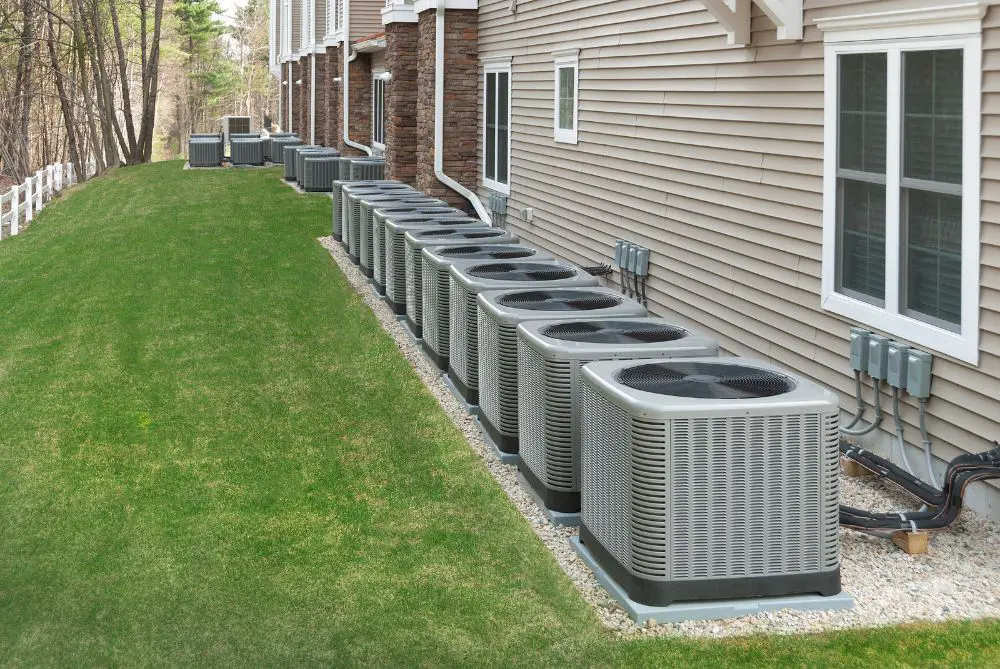
That’s why it’s essential to purchase the most energy-efficient heating possible for your particular home. As previously discussed, the climate you live in will play into this decision. If you live in a warmer place, a heat pump will save money and the environment — because of its heating and cooling versatility, and because of its efficiency. On the flip side, using a heat pump in a very cold climate might ultimately be more environmentally harmful than burning natural gas to fuel a modern, energy-efficient furnace.
Then there are the heating systems themselves. Heat pumps use refrigerants, which aren’t great, and furnaces burn fuel, which is also not ideal. Luckily refrigerant formulation has seen big improvements in recent years, and ingredients are far less toxic. (In particular, look for units coming on the market utilizing a more eco-friendly “R32” refrigerant.) Furnace technology has advanced, and modern furnaces are undeniably more energy-efficient and less polluting than they used to be.
Verdict: Because heat pumps: 1. Do not use combustion to generate heat 2. Are generally more efficient, and 3. Produce less greenhouse gas emissions — they are the greener choice.
Who’s the Winner: Heat Pump vs. Furnace?
We wish we could declare a clear winner. Still, the choice between a heat pump and a furnace is genuinely dependent on the situation. Sure, heat pumps are newer, flashier, and undoubtedly more efficient and eco-friendly in a lot of cases. But don’t count out the tried and true furnace — especially a modern and efficient gas furnace. There are plenty of homes for which it makes good financial and ecological sense to install one.
The most apparent advantage between the two may come down to the difference in technology. As we’ve learned, heat pumps don’t generate heat; they transfer it. The colder the climate, the harder a heat pump has to work to transfer heat, and the fewer cost-savings you are likely to enjoy. However, if you live in a moderate climate, a heat pump is the clear choice. You’ll want a system that can pull toasty air towards you in the winter, and transfer that heat right back away from you in the summer.
Ultimately only you can determine which heating system is right for your home, but now you have the information to make an educated choice. Knowledge is power; it might even keep you warm!
Further Reading
